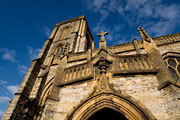Yeovil, located near the Somerset-Dorset border, is a thriving market town with a population of around 40,000. The name is derived from the River Yeo (or Ivel as it sometimes known) on which it lies.
 The town began life as a Roman settlement but it was during the Middle Ages when a market was established that Yeovil became a thriving town. Unfortunately, after a series of fires between the 15th and 17th century practically none of the old town survives. The 14th century Church of St John the Baptist is perhaps the only exception. A fairly impressive, if not austere, building with a 92 feet (28 m) tower and a proliferation of windows lending it to the name of the ‘Lantern of the West’.
The town began life as a Roman settlement but it was during the Middle Ages when a market was established that Yeovil became a thriving town. Unfortunately, after a series of fires between the 15th and 17th century practically none of the old town survives. The 14th century Church of St John the Baptist is perhaps the only exception. A fairly impressive, if not austere, building with a 92 feet (28 m) tower and a proliferation of windows lending it to the name of the ‘Lantern of the West’.
In the 18th century the town grew further as a coaching centre due to its location on the convergence of several important routes. Industry also flourished in Yeovil with glove making, leather working and cheese production being particularly important.
By the 1850s the railway had arrived and soon after the town gained borough status and was given a mayor.
Although a busy livestock market ensures that Yeovil’s heritage as a country town is not lost, Yeovil’s two theatres, several nightclubs, 10-screen cinema and 18-lane 10-pin bowling alley easily make it the main urban centre for south Somerset. The town also features a modern pedestrian shopping precinct that is home not only to a major department store but, in true Somerset style, to a twice-weekly outdoor market.
The town was heavily bombed during the second world war, largely due to its prominence within the defence industry, for which Yeovil continues to be known today through the continuation of companies such as AugustaWestland, helicopter manufacturers, and Normalair Garratt, manufacturers of aircraft oxygen systems.
Yeovil has two separate railway stations served by two separate railway lines and the town football club has been known to almost nudge its way into the premier league.
Yeovil is and has been home to a number of luminaries, including the modernist poet T.S.Eliot, who is buried in nearby East Coker, cricketer Ian Botham, who began to hone his skills as a boy on the town recreation grounds and PJ Harvey, an intensely original singer-songwriter.



